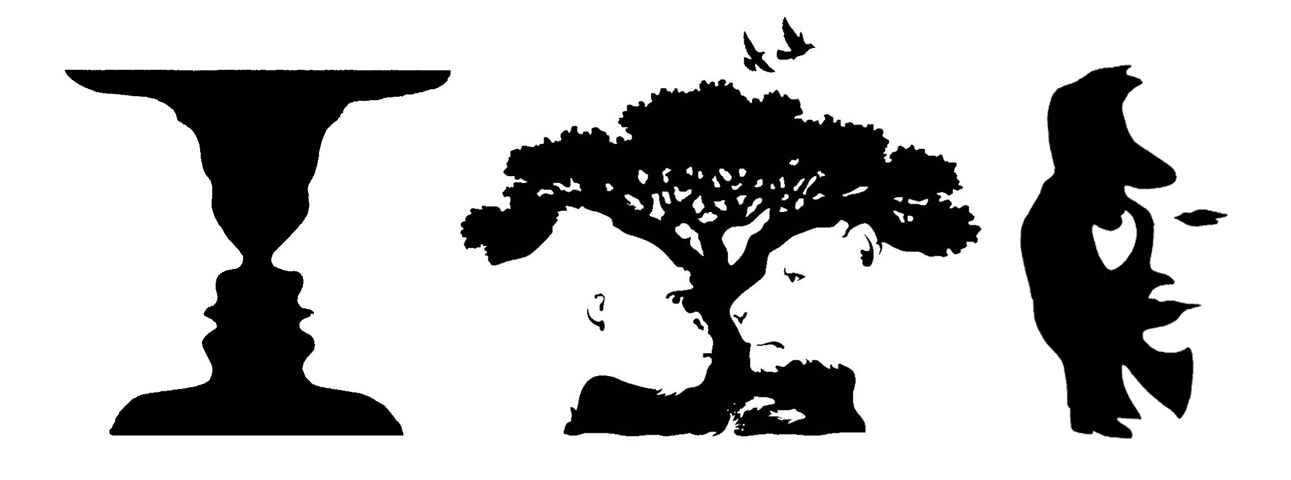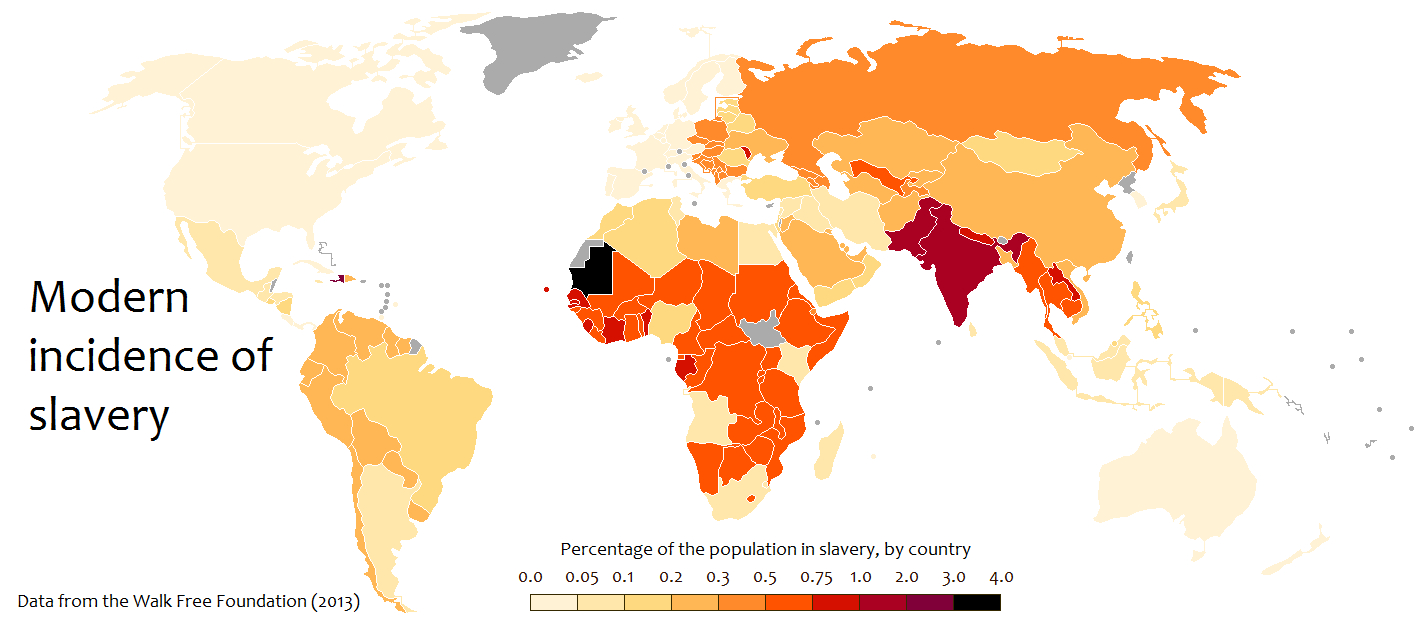Rubin Vase
At some point in your life, you may have seen the image on the left known as a Rubin vase. The idea behind a Rubin vase is that it demonstrates the way in which the brain makes sense of the world. Or, rather, tries to make sense of the world. The Rubin vase is what is known as a bi-stable image, meaning it creates two different stable perceptions: one of a vase, and one of a pair of faces.
From vases to faces. From trees to animals. These are some simple examples. Not all of them are that easy to recognise, but once our brain has registered both perceptions we cannot look at those images in the same way as before. We will always see both perceptions, instead of one.
From vases to faces, from people to the world. The brain can switch from seeing the world from one way to a completely different way. It may not be recognisable at first but when the brain does connect the dots, it can never go back from seeing the world in just one way. We then have renewed our minds.
The Bible speaks of this renewal of the mind
From Ephesians 4:23 (“be renewed in the spirit of your mind”), to Colossians 3:10 with the emphasis on the “new man”, to the exhortation in Romans 12:2 to be “transformed by the renewing of your mind”; Philippians 4:8 (“whatever is true… think on these things”); Philippians 2:5 (“have the same mind that is in Christ”); 2 Corinthians 10:5 (“take every thought captive to obey Christ”); et cetera.
Clearly, there is a divine paradigm, a way in which God wants His people to think.
Paradigm shift: 'gestalt' switches on a large scale
Whereas 'Gestalt switch' points to our individual experiences, once they occur on a larger scale, let's say on the scale of nations and societies, cultures, and result in a change of behaviour, policies, and the like, we tend to speak of a 'paradigm shift'. A change in pattern of not only our individual behaviour but that of nations, organizations, societies and cultures. We then all have renewed our minds...
Paradigm shift: an example from the world of science and education
The Indian Education Commission (1964-1966), popularly known as the Kothari Commission, was an ad hoc commission set up by the Government of India to examine all aspects of the educational sector in India, to evolve a general pattern of education and to advise guidelines and policies for the development of education in India.
Three sets of interrelated ideas go on to constitute the commission’s vision:
- Social and educational inequalities share a close connection;
- Emphasis on scientific literacy in a broader sense that would encompass reason, justice and empathy;
- English is critical to gain access to scientific knowledge and should be taught in school as a subject;
The commission's recommendations were incorporated into India's National Policy on Education, which has been attributed to being one of the key factors, a paradigm shift, in India's rapid (economical) development over the past decades.
You know something, what you know you can’t explain, but you feel it…
You have felt it you’re entire life, that there’s something wrong with the world…
You don’t know what it is, but it’s there, like a splinter in your mind…
Paradigm shift: The Iraq War
In the years leading up to the Iraq war of 2003, we, citizens of (Western) democratic societies were led to believe that the world would be better off once the cruel dictator Saddam Hussein was toppled, removed from power; more over because this dictator was plotting against us, sponsored terrorism and was actively developing weapons of mass destruction (WMD).
We were told lies. Lies that ruined a sovereign nation-state, killed hundreds of thousands of its citizens and destroyed the lives of thousands of soldiers who were sent over there to defend Western interests. The Iraq War fuelled the emergence of ISIS. If not the crime of the century, then it was definitely the crime of the decade. The aggressors are still at large, went on living their lives without facing criminal charges in the international court of law.
General Colin Powell
Many of us may have bought into that war and supported it initially; if not for the message or the so-called 'facts', but for the messenger.
General Colin Powell was selected to present the case to the UN. He did so and convinced most of us that this cause was just.
Powell had allied himself as Defence Secretary with the Neo-Conservative cabal of Pres. George W. Bush. These Neo-Conmen had made an excellent choice. Powell was probably the only man that carried enough weight and trust to deliver the casus bellum to the international community.
However, in doing so the NeoCons also made their single biggest mistake. If it hadn’t been for Colin Powell many of us would never have bought into their lies, nor would we have been able to see through them eventually…
For Powell had crafted the perfect Rubin vase out of the WMD lie. Once the lie surfaced, it exposed the faces of the perpetrators of that war for what they really are: thugs.
The Iraq War caused a paradigmatic switch in the way we look at the role of the US as an international power house, the involvement of our own governments in the war and the role of government at large.
Should we be involved overseas if we are still unable to solve many issues domestically?
Paradigm shift: The banking crisis of 2008-2009
The Iraq War was but one event in a chain of disasters that can be traced back to the ending of World War II, emerging in the 70's under US President Nixon and catalysed under the alternating 'conservative' and 'social-democrat' US/UK governments of Ronald Reagan, George Bush sr., Margaret Thatcher, Bill Clinton, Tony Blair and Gordon Brown.
They all can be categorized as Anglo-Saxon implementors of deregulatory strategies, 'free market' ideologies and trickle down economics. Either socialist with a capitalist veneer, or capitalists with a socialist veneer, depending on the perspective. Neo-Liberalism being their common denominator.
The Iraq War may well have served as a deflection for an even bigger disaster in the making, which finally broke at the end of 2007.
The 2008 blow out not only exposed a fundamental lack in governance and oversight in banking, but also in insurance, pension funds, housing, health care and the education system. But bankers are not the same people as politicians, right? No, they're not the same people, they have different skill sets, they occupy different jobs and have different responsibilities...
The banking melt-down however revealed that they are all part of the same failed system of revolving doors, futile backroom dealings, and flawed policies. They are different animals who are all barking up the same tree. In fact, they are feeding off of that same tree. The tree of corruption. If not in terms of monetary corruption, then at least in terms of morals and mindfulness.
Banks who previously had been declared 'too big to fail' turned 'systemic' overnight, as the politicians came to the rescue of their banking brethren.
This is how the disaster was 'spun'. Yet, the watchful amongst us could not help but notice that these private losses were socialized at the expense of the societies involved. In some cases banks failed, were nationalised or taken over by competitors; what remained however was a remaining lack in oversight and governance for what otherwise must be deemed as 'criminal neglect'; while millions lost either their employment or their house or both.
Hardly one banker or politician was convicted for crimes committed. For the most part old scores were settled, leading to token sanctions, fines or imprisonment for those unfortunate enough to have stepped too much out of bounds with the cabal.
We do not have to take the red or blue pill or any other pill for that matter. We can experience a ‘Gestalt’ switch in the way we look at life, in particular the way we look at society and the world, triggered by major events that have affected our lives and those of others...
Not a different perspective, but a new perspective
For those of us who were witness to the events, either as a victim, a perpetrator or as an observer, life will never be the same thereafter. Since we have become ever more interconnected, we all are ever more affected and have become far more susceptible to paradigmatic shifts in perspective.
A paradigmatic shift of perspective affects us at the root level. It affects our trust. Trust in our fellow human beings, our government, and societies at large. For those of us that were adversely affected by wars or economic melt-downs, our trust, and the ability to trust, took a beating.
A wound has been inflicted upon them. A wound that needs time to heal. The process of healing takes time but it needs more than that. Not a different perspective, but a new perspective. A change, real change...
Ludwig Widgenstein
The Austrian born British philosopher Ludwig Wittgenstein (1889-1951) called this switching back-and-forth between two interpretations of an image, a “Gestalt" switch, a mental switch from seeing the world one way to another completely different way. “Gestalt” is a German word for form or shape.
Thomas Kuhn
Thomas Samuel Kuhn (1922 – 1996) was an American physicist, historian and philosopher of science, whose controversial 1962 book The Structure of Scientific Revolutions was influential in both academic and popular circles, introducing the term paradigm shift, which has since become an English-language idiom.


